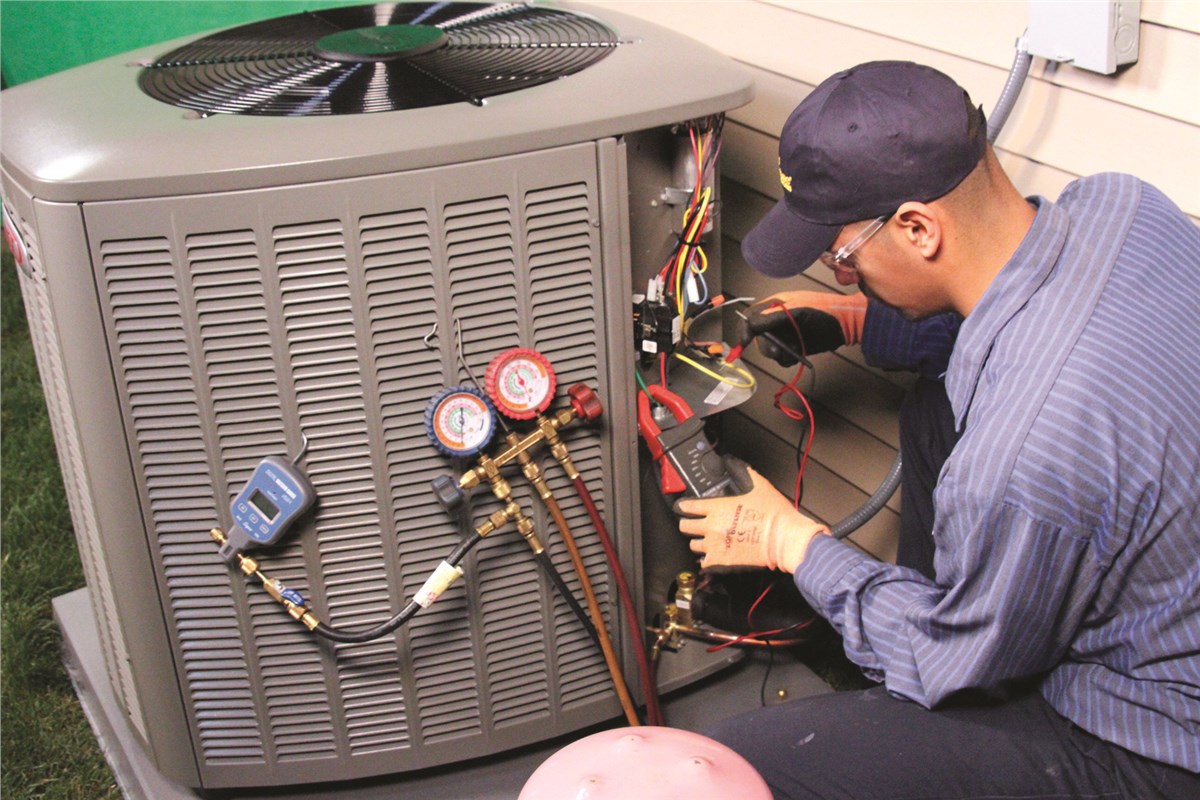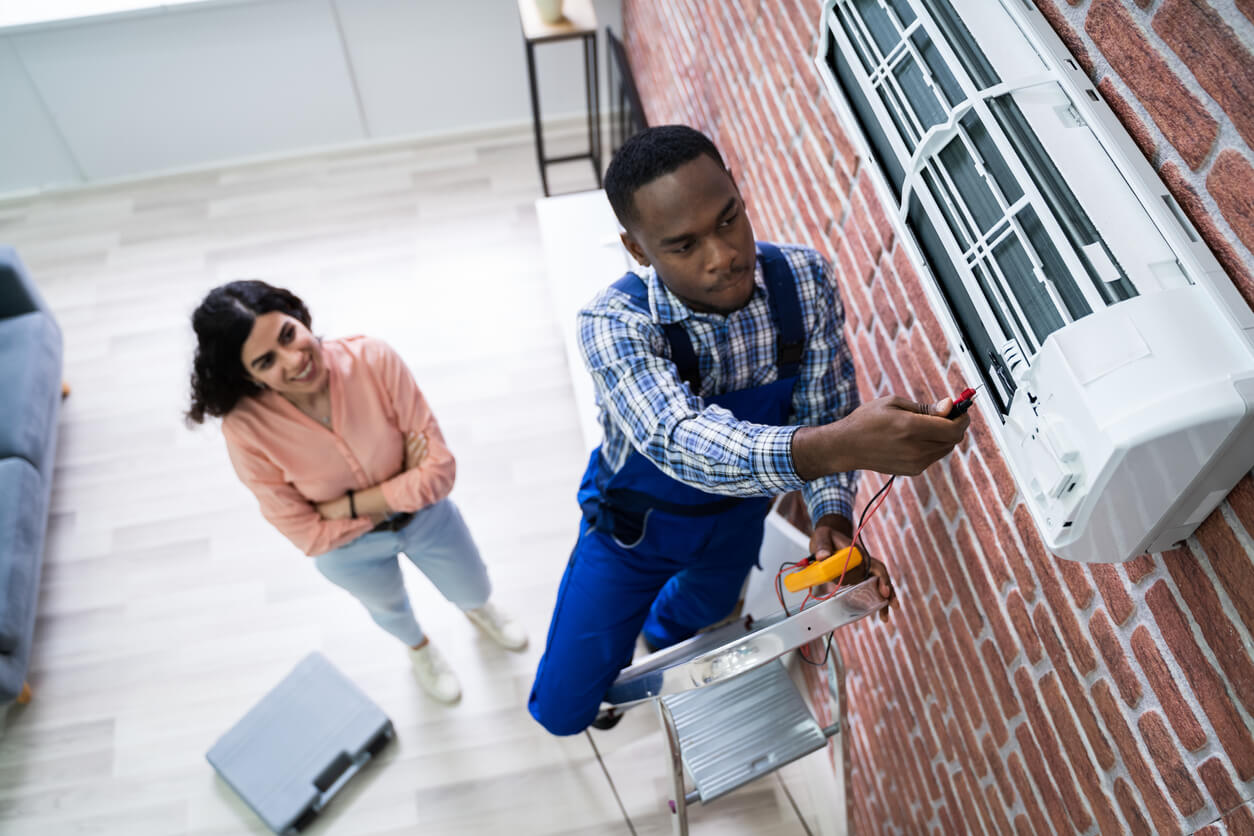The Best Strategy To Use For Air Conditioning Repair
The Best Strategy To Use For Air Conditioning Repair
Blog Article
Repair Air Conditioning Unit: Repair The Cooling System To Restore Comfortable Indoor Temperatures
Identifying Common A/c Unit Issues
Ever found yourself sweltering in the middle of a heatwave, just to understand your ac system isn't cooling as it should? It's discouraging, however more typical than you may believe. Many homeowners deal with these concerns yearly, from strange sounds to uneven air flow. Why does this occur?
Top Problems That Frequently Appear
- Refrigerant Leaks: When the cooling agent leaks, the AC struggles to chill the air, leaving you with hot blasts rather of refreshing breezes.
- Frozen Evaporator Coils: Ever observed ice buildup? It's an indication the system's working overtime or airflow is obstructed.
- Clogged Air Filters: Dust and particles can choke the system, causing it to labor harder and potentially overheat.
- Faulty Thermostat: Sometimes, the perpetrator is as simple as a misreading thermostat, sending out wrong signals to your system.
- Drainage Problems: Water pooling around the unit? Obstructed drain lines may be the sneaky bad guy here.
How to Acknowledge These Problems Early
Is your AC making odd sounds-- a grinding or rattling? That's a warning. Or has your electrical expense inexplicably increased without a change in usage? Inadequacy typically hides behind such clues.
| Sign | Possible Cause | Quick Fix Tip |
|---|---|---|
| Warm air blowing | Low refrigerant or compressor failure | Inspect refrigerant levels; call an expert for compressor issues |
| Unit will not switch on | Electrical concerns or thermostat malfunction | Reset breaker; change thermostat batteries |
| Water leakage | Obstructed drain line | Clear drain with a wet/dry vacuum |
Why Do These Problems Take place?
Consider your air conditioner as a fragile ecosystem. Interrupt one part, and the whole system stumbles. Sometimes, it's neglect-- a forgotten filter change-- or external aspects like power rises. What's clear is that ignoring early indications only turns small problems into significant headaches.

Essential Tools for A/c Repair
Ever discovered yourself looking at a frozen evaporator coil or a persistent compressor that declines to hum back to life? You'll quickly recognize that having the right tools isn't just a convenience-- it's a need. Envision trying to assess refrigerant pressure with a damaged gauge or patching a leak without an appropriate vacuum pump. The frustration is real, but the service lies in preparation.
Core Tools Every Technician Must Have
- Manifold Gauge Set: For precise measurement of refrigerant pressures-- this is your diagnostic compass.
- Vacuum Pump: Eliminating wetness and air from the system is crucial; avoiding this step threats contamination.
- Multimeter: Electrical energy flows quietly, but a multimeter speaks volumes about voltage, existing, and connection.
- Fin Comb: Bent fins on the condenser can choke air flow. This easy tool restores air flow efficiency quickly.
- Refrigerant Leakage Detector: Pinpoint elusive leakages that might otherwise fly under the radar.
Pro Tips for Using Your Tools
- Never link gauges without first confirming the system is off. It prevents damage to your instruments and safeguards your fingers.
- When using the vacuum pump, run it for at least thirty minutes to guarantee all moisture is extracted-- shortcuts here lead to system failure.
- Adjust your multimeter frequently; even small mistakes can misguide troubleshooting efforts.
- Use the fin comb carefully; excessive force can trigger more damage.
Air Conditioning Service Jacksonville FL
Air Conditioning Maintenance Jacksonville FL
Air Conditioning Repair Service Near Me Jacksonville FL
Air Conditioning Replacement Jacksonville FL
What's typically neglected is how these tools interaction. For instance, a refrigerant leak detector guides where to connect your manifold determines to evaluate pressure drops accurately. Have you ever noticed how a basic tool swap can shave hours off a repair work task? That's the kind of effectiveness every professional craves.
Step-by-Step Repair Recommendations for Your Air Conditioner
Ever stood sweating while looking at a persistent a/c system that declines to cool? The buzzing hum that suddenly turns into silence can be frustrating. How do you even begin to untangle this web of mechanical misdeed? Let's cut through the confusion with a clear, expert-guided procedure.
1. Identify the Core Concern
Before diving into repair work, ask: is the issue electrical, mechanical, or refrigerant-related? A quick test-- turn off the system and check the circuit breaker. Tripped breakers frequently conceal the origin. Next, examine the thermostat settings. In some cases, the fix is as basic as recalibrating your thermostat or changing its batteries.
2. Check the Air Filter and Coils
A stopped up filter or filthy coils can choke your a/c unit's performance. Pull out the filter:
- If it looks grimy or dirty, swap it right away.
- Use a vacuum or soft brush to clean up the evaporator coils gently.

Keep in mind, an ignored filter resembles trying to breathe through a headscarf in a sauna-- inadequate and aggravating.
3. Examine the Condensate Drain
Blocked drains pipes result in water accumulation, activating sensing unit shutdowns. Use a stiff wire or a wet/dry vacuum to clear the drain line. This quick repair prevents leakages that can trigger larger headaches.
4. Evaluate the Capacitor and Fan Motor
These components typically stop working calmly. Utilizing a multimeter, inspect the capacitor for voltage consistency. If readings change wildly or check out zero, replacement is in order. For the fan motor, listen for grinding or irregular spinning-- signs of impending failure.
Quick Reference Table: Common Symptoms and Repairs
| Sign | Probable Cause | Specialist Pointer |
|---|---|---|
| Air conditioner not cooling | Dirty filter or low refrigerant | Tidy filter first; examine for leaks with soapy water |
| System will not start | Tripped breaker or defective capacitor | Reset breaker; test capacitor with multimeter |
| Water dripping inside | Blocked condensate drain | Clear drain line to prevent overflow |
Now, you might wonder, "Is it actually worth attempting to repair this myself?" Consider this: many repair work depend upon patience and the right tools rather than raw technical skill. A constant hand and a check here little troubleshooting can save hours and dollars. Similar to any detailed maker, the key lies in understanding its language-- the hums, clicks, and silences-- and reacting accordingly.
Opening Longevity: Preventive Maintenance Tips for Air Conditioner Systems
Ever seen how a whispering breeze can turn into a stifling furnace when your a/c falters? That subtle hum is often the first indication of hidden pressure. Overlooking these whispers can lead to a complete breakdown simply when you need cool relief the most. What if you could capture these early murmurs before they intensify?
Start with the filter. It's easy to neglect, yet a clogged up filter chokes airflow, requiring your system to work overtime and spike energy usage. Altering or cleaning up filters every 30 days during peak usage isn't simply great practice; it's a lifesaver for your air conditioning's performance.
Secret Preventive Steps:
- Check the coils: Dirt build-up on evaporator and condenser coils lowers heat absorption and release. A mild brush or vacuum can restore their beautiful condition.
- Clear the condensate drain: Obstructions here can cause water damage and boost indoor humidity. An easy wire or compressed air blast can keep this course clear.
- Check refrigerant levels: Too low, and your air conditioning strains to cool; too high, and it risks compressor damage. Only licensed specialists should manage refrigerant changes.
- Test the thermostat's accuracy to avoid unneeded cycling or discomfort.
Remember the story of the old system that froze solid one summertime? The culprit was a tiny leak that slipped previous undetected. Small concerns typically mimic regular wear but compound quickly. Remaining ahead with routine evaluations and seasonal tune-ups can prevent these hidden disruptions.
| Maintenance Task | Frequency | Impact |
|---|---|---|
| Filter Replacement | Every 30 days | Improves air flow and lowers pressure |
| Coil Cleansing | Each year | Enhances heat exchange effectiveness |
| Drain Cleaning | Quarterly | Avoids water damage and mold growth |
| Refrigerant Check | Annually | Ensures optimal cooling efficiency |
Isn't it curious how the smallest tweaks-- like tightening up loose electrical connections or lubricating moving parts-- can spin your air conditioning back to peak type? These aren't simply fixes; they're investments in comfort. After all, a properly maintained unit doesn't just cool; it whispers cool peacefulness, even in the most blistering heat.

A/c Unit Repair Services in Jacksonville, FL
Jacksonville, FL, is a vibrant city known for its comprehensive park system, beautiful beaches, and bustling cultural scene. As the most populous city in Florida, it uses a varied variety of outdoor activities consisting of fishing, boating, and checking out the Timucuan Ecological and Historic Preserve. The city's warm environment makes cooling an important part of daily convenience for locals and services alike.
For those needing to repair ac system, Bold City Heating and Air supplies expert consultation and advice. They are ready to help ensure your cooling system runs effectively through Jacksonville's hot seasons. Connect to them for a totally free assessment to address your air conditioning repair needs.
Report this page